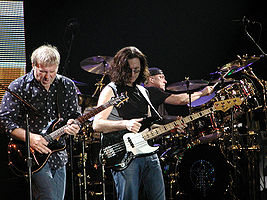Nick Krewen
The Kitchener-Waterloo Record
December 24, 1998
On the eve of their 25th anniversary, the future of Rush is uncertain.
A pair of personal tragedies suffered this year by drummer and lyricist Neil Peart, namely the double blow of losing his daughter and wife within a few months of each other, has placed a question mark on whether the enduring Canadian band will continue.
“It’s difficult to discuss a tragedy of this magnitude, and even thinking about the future of Rush in that context to me is inappropriate,” replied singer and bassist Geddy Lee, speaking on behalf of guitarist Alex Lifeson during a recent interview at Anthem Records, the band’s Toronto headquarters.
“In my mind, I don’t even go there. It’s just a terribly heartbreaking time for all of us.
“Our job is to be supportive of him.”
The trio of Lee, Lifeson and Peart have been joined at the hip since Rush’s 1974 album Fly By Night, and have launched 23 albums together, building a loyal, international following as they’ve explored themes from philosophy through science fiction.

Geddy Lee
Photo: Matt Becker, Creative Commons
On November 30, Rush released their latest CD, a triple-disc effort called Different Stages — Live recorded during their 1997 North American tour. The third disc is a limited edition bonus of Live At Hammersmith 1978, recorded during the trio’s A Farewell To Kings tour.
It’s the band’s fourth live album, and Lee says it was the easiest to record.
“I think we got some terrific performances,” enthuses Lee, dressed casually in black slacks, t-shirt and jacket.
“I look for a reason to do these things outside of a document. With the completion of every live album, there’s the feeling that I’m not convinced we got the band at its best. This time there was a determined effort to record the band naturally — by that I mean recording every day in a discrete manner that doesn’t distract you from your job.”
Lee explains that Rush’s previous live albums, including 1977’s All The World’s A Stage, 1982’s Exit…Stage Left and 1991’s A Show Of Hands — used mobile recording studio trucks.
“You’re invaded by dozens of people and you do two soundchecks — one for the truck and one for the audience…and you kind of forget who you’re playing for,” he says.
“You’re uptight because all this interference makes you uptight. As a result, you’re over-concentrating every note you play because you know the tape is rolling, and you don’t want to make a mistake and embarrass yourself.”
Lee states that for Different Stages — Live, the band recorded every performance on their tour, which differed from previous Rush performances in that the Toronto progressive trio commanded the stage for three hours each evening.
“Everyone was more confident, relaxed and loose. In the end we got a very consistent level of performance from beginning of the tour to the end.”

Rush
Lee, 45, says if Rush tours in the future, he’d love to repeat the three-hour experience.
“I really liked it a lot, “he confessed. “I loved that we could go on earlier. There was less waiting around backstage, less chaos, and because we could do the soundcheck later, we had the whole day to ourselves.
“Then you hit the stage and do what you’re there for. You’ve got a crowd who has their undivided attention on you. By far, it was the most pleasurable tour I’ve ever done.”
Rush has been in an enigma in the music business, as their fan allegiance has transformed every album of their catalogue into either gold or platinum status.
“There’s an audience of people who has always been interested in rock that’s not simplistic,” Lee explains. “And I think that some of the subjects that Neil has dealt with in the past lyrically have struck chords with people. A kid told me once that we are some kind of rite of passage, because he has all these friends that go to school, discover Rush, and then move onto other things. I like that.”
Lee would also like to dispel at least one myth about himself.
“I’m much taller in person,” he laughs.

